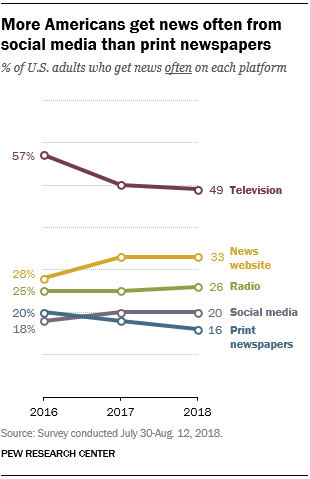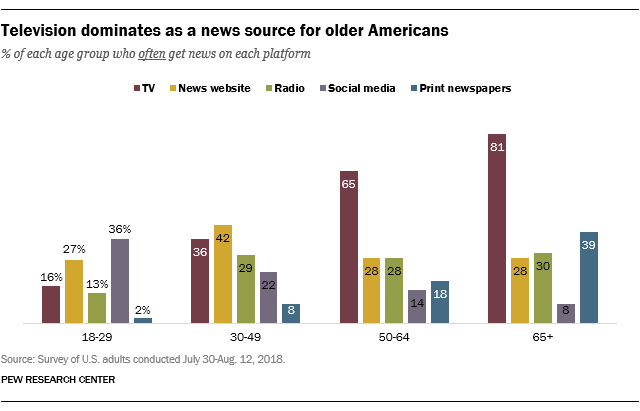It’s not true that everyone gets their news from Facebook and Twitter. But is now true that more U.S. adults get their news from social media than from print newspapers. According to a new report from Pew Research Center out today, social media has for the first time surpassed newspapers as a preferred source of news for American adults. However, social media is still far behind other traditional news sources, like TV and radio, for example.
Last year, the portion of those who got their news from social media was around equal to those who got their news from print newspapers, Pew says. But in its more recent survey conducted from July 30 through August 12, 2018, that had changed.
Now, one-in-five U.S. adults (20%) are getting news from social media, compared with just 16 percent of those who get news from newspapers, the report found. (Pew had asked respondents if they got their news “often” from the various platforms.)

The change comes at a time when newspaper circulation is on the decline, and its popularity as a news medium is being phased out – particularly with younger generations. In fact, the report noted that print only remains popular today with the 65 and up crowd, where 39 percent get their news from newspapers. By comparison, no more than 18 percent of any other age group does.
While the decline of print has now given social media a slight edge, it’s nowhere near dominating other formats.
Instead, TV is still the most popular destination for getting the news, even though that’s been dropping over the past couple of years. TV is then followed by news websites, radio, and then social media and newspapers.
But “TV news” doesn’t necessarily mean cable news networks, Pew clarifies.
In reality, local news is the most popular, with 37 percent getting their news there often. Meanwhile, 30 percent get cable TV news often and 25 percent watch the national evening news shows often.

However, if you look at the combination of news websites and social media together, a trend towards increasing news consumption from the web is apparent. Together, 43 percent of U.S. adults get their news from the web in some way, compared to 49 percent from TV.
There’s a growing age gap between TV and the web, too.
A huge majority (81%) of those 65 and older get news from TV, and so does 65 percent of those ages 50 to 64. Meanwhile, only 16 percent of the youngest consumers – those ages 18 to 29 – get their news from TV. This is the group pushing forward the cord cutting trend, too – or more specifically, many of them are the “cord-nevers,” as they’re never signing up for pay TV subscriptions in the first place. So it’s not surprising they’re not watching TV news.
Plus, a meager 2 percent get their news from newspapers in this group.
This young demographic greatly prefers digital consumption, with 27 percent getting news from news websites and 36 percent from social media. That is to say, they’re four times as likely than those 65 and up to get news from social media.
Meanwhile, online news websites are the most popular with the 30 to 49-year old crowd, with 42 percent saying they get their news often from this source.
Despite their preference for digital, younger Americans’ news consumption is better spread out across mediums, Pew points out.
“Younger Americans are also unique in that they don’t rely on one platform in the way that the majority of their elders rely on TV,” Pew researcher Elisa Shearer writes. “No more than half of those ages 18 to 29 and 30 to 49 get news often from any one news platform,” she says.
Read Full Article
No comments:
Post a Comment